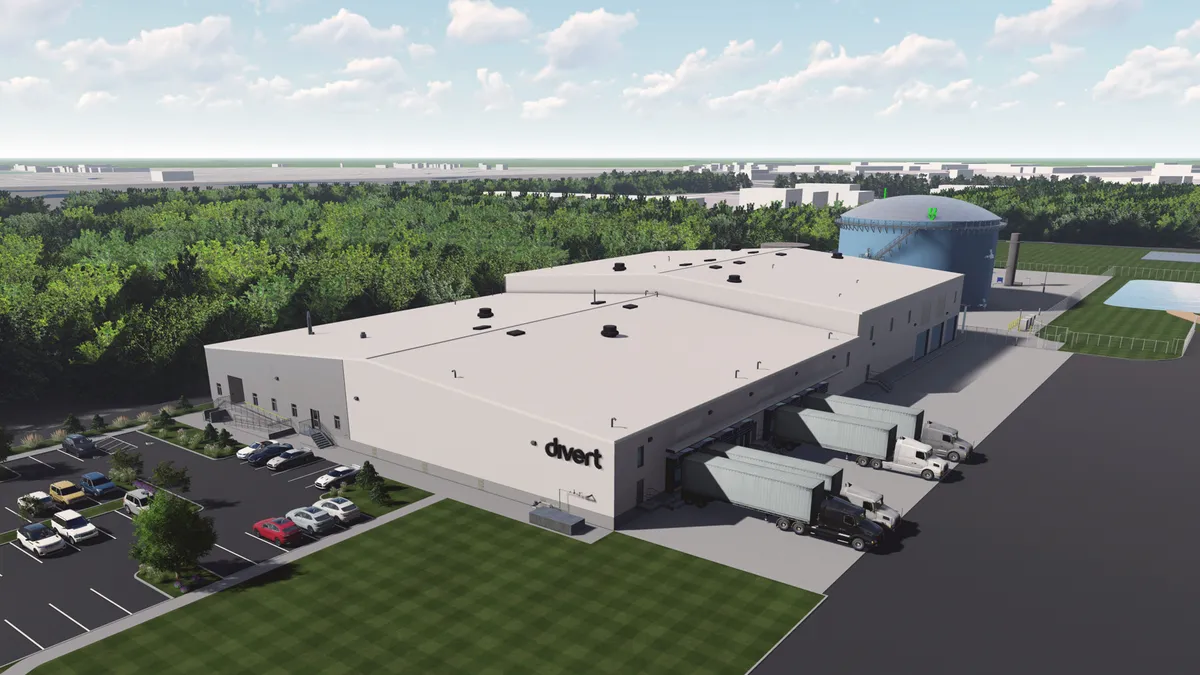Dive Brief:
- Anaerobic digestion company Divert broke ground on a 60,000-square-foot facility in Longview, Washington, on Thursday, the company announced. When built, the facility will be able to process 100,000 tons of food waste per year from Washington and Oregon as well as producing renewable natural gas.
- Executives say it’s the first industrial project that's gotten through the state’s environmental review process in southwest Washington in over a decade. The project accepts preconsumer waste and will help commercial generators comply with the state’s Organics Management Law that passed last year.
- Enbridge is partnering with Divert to finance the $100 million project, which they expect will open in 2024.
Dive Insight:
HB 1799, Washington’s Organics Management Law, requires municipalities to develop plans for source-separated organics collection and disposal starting in July of next year, with some exceptions. Businesses that generate at least eight cubic yards of organic waste each week would also be required to manage such waste on site or through collection services.
The Longview facility is located about 50 miles north Portland, Oregon, and is also expected to benefit from the Oregon Metro’s Food Scraps Policy, which requires businesses in the Portland metro area to separate food scraps.
Divert’s project will receive feedstock from large commercial food waste generators, including sources like agricultural food producers or industrial food manufacturers. In addition to anaerobic digestion, it will also contain depackaging and liquefaction technology.
Chris Thomas, vice president and head of public affairs for Divert, said he’s heard from a variety of stakeholders that such projects are difficult to get off the ground, as regulators want to ensure processing capacity for organics diversion while waste generators want to see the capacity already in place before they commit to a feedstock agreement. Thomas said Divert’s network of 5,400 retail stores with agreements in place has helped ease some of that friction.
“It’s a little bit of a chicken and egg approach,” Thomas said. “It's difficult ... to be sure that you can spend the millions and millions of dollars to develop, engineer and construct these new facilities without ensuring that you have customers in place.”
The facility, once complete, will also generate RNG. It received a boost from the clean energy tax credit included in the Inflation Reduction Act. In a statement, Sen. Maria Cantwell (D-WA) said the project was “exactly what we had in mind” when drafting the federal incentive.
“This is a very bright spot for the whole State of Washington, to see this kind of economic development that creates jobs by taking a waste product and turning it into affordable energy,” Cantwell said.
Divert also provides analytics to the stores from which it receives organic waste. Thomas said that his company actively encourages its clients to become more efficient at reducing waste in addition to accepting what cannot be reused or saved.
This is Divert’s second RNG facility. Earlier this year, it broke ground broke ground on a facility in Turlock, California, which will have similar capacity and is also expected to open in 2024. In March, the company announced a $1 billion infrastructure development agreement from Enbridge, and Thomas said the agreement is helping speed up the company’s pipeline of projects.
The company’s two RNG facilities under construction are poised to take advantage of state laws like HB 1799 or California’s SB 1383 which have organics collection and diversion mandates. Thomas said those laws have far-reaching effects on changing consumers’ and businesses’ behavior when it comes to waste, and he’s heard interest from generators in states without tough laws that nevertheless would like to see greater organics processing capacity.
“Public policy that [regulators] are changing and advocating for, it has a far-reaching effect in some of these other states,” Thomas said. “We see that complying with these laws is not only the right thing to do from a sustainability and ESG perspective... but they also make money from it.”











